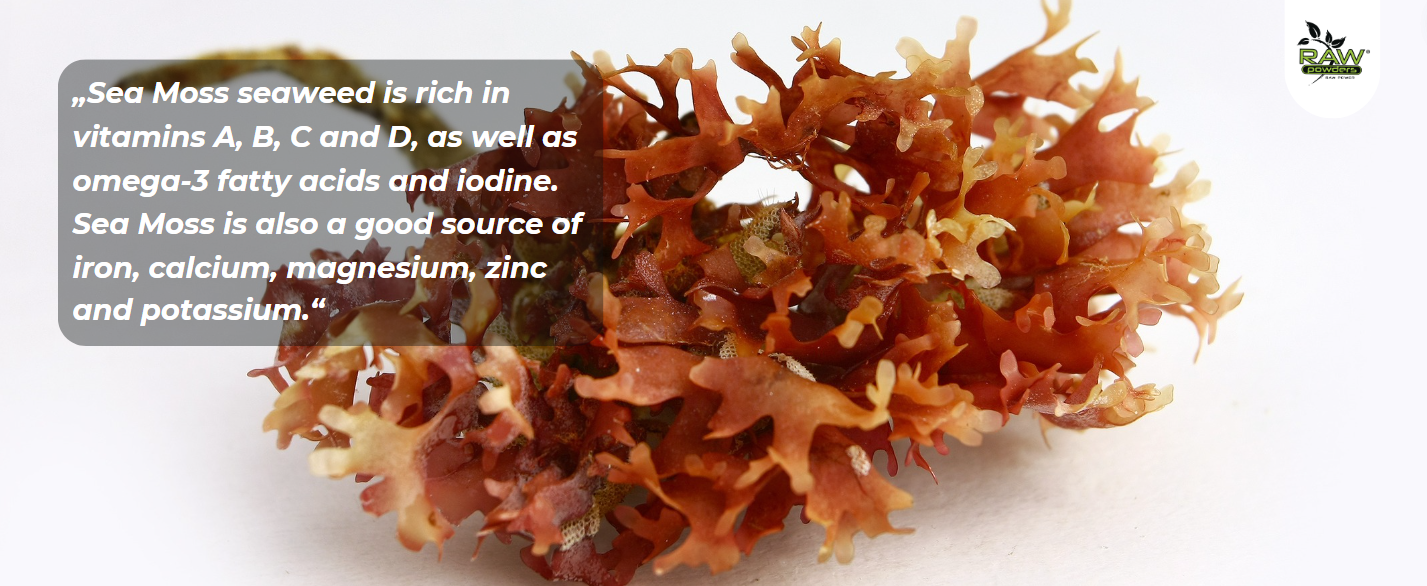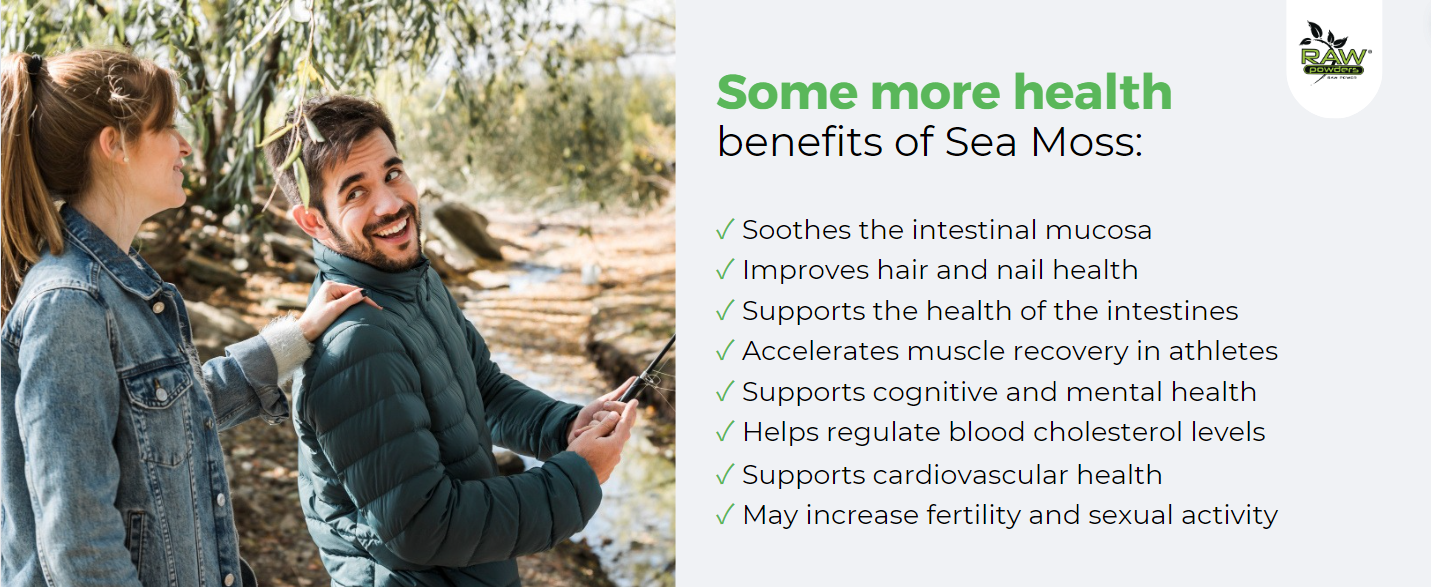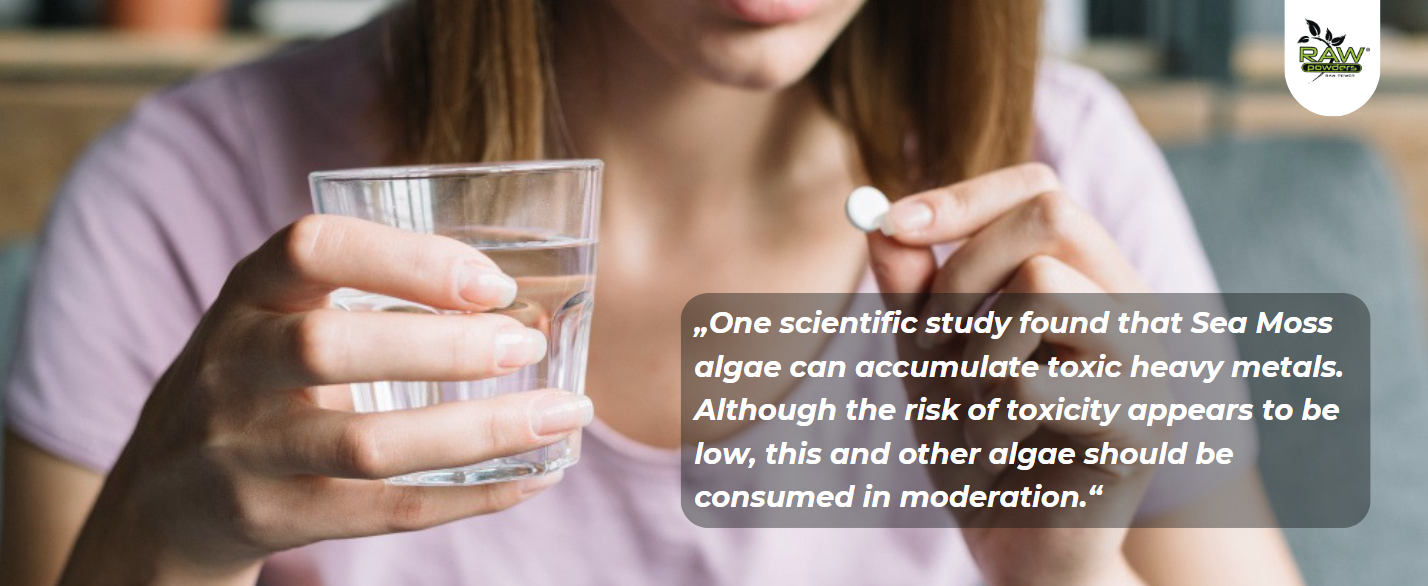HEALTH BENEFITS OF SEA MOSS: YOUR PATH TO HEALTH AND VITALITY

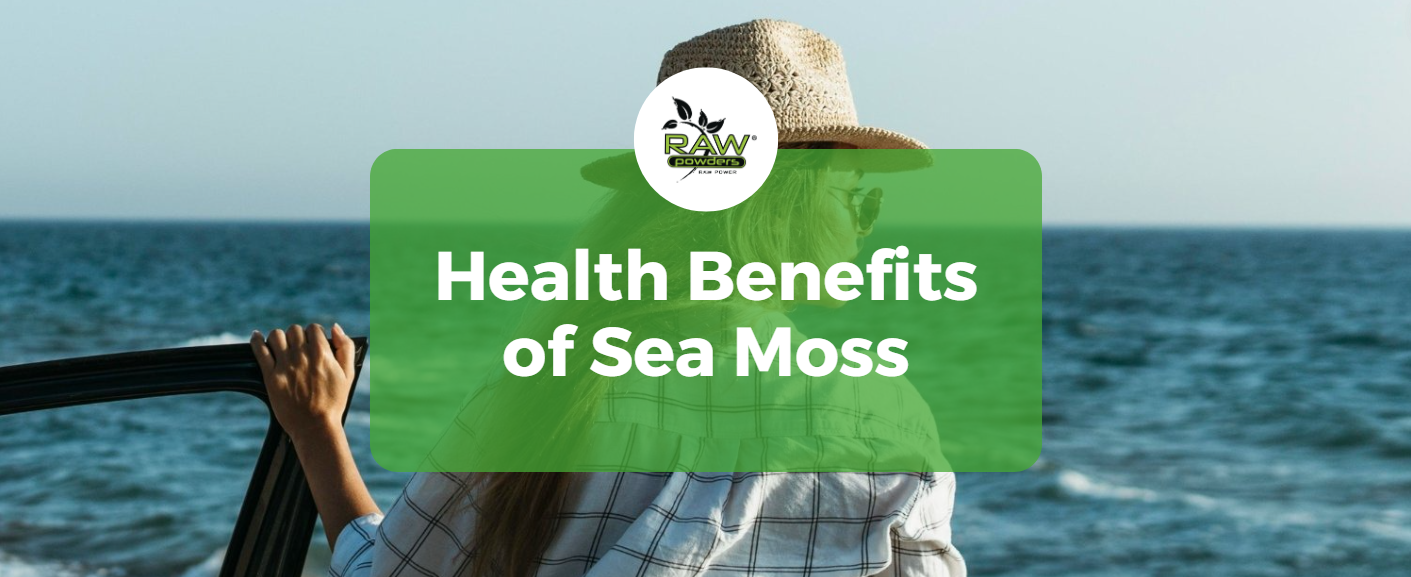
In the world of superfoods, Sea Moss (Chondrus crispus), commonly referred to as Irish Moss, stands out due to its nutritional composition. This red seaweed, which is found along rocky coastlines, has become well-known for its substantial nutritional content. It is more than just a passing trend; it's a versatile and nutrient-rich food that caters to a variety of dietary preferences.
Seaweeds are a characteristic part of the traditional diet in countries such as Japan and Korea; these countries also have a lower prevalence of metabolic syndrome than countries such as the USA and Australia. This suggests that seaweeds may contain compounds that reduce the characteristic signs of obesity, diabetes, hypertension, fatty liver and inflammation in the metabolic syndrome. Potentially bioactive compounds from seaweeds include polysaccharides, peptides, pigments, minerals and omega-3 fatty acids [1].
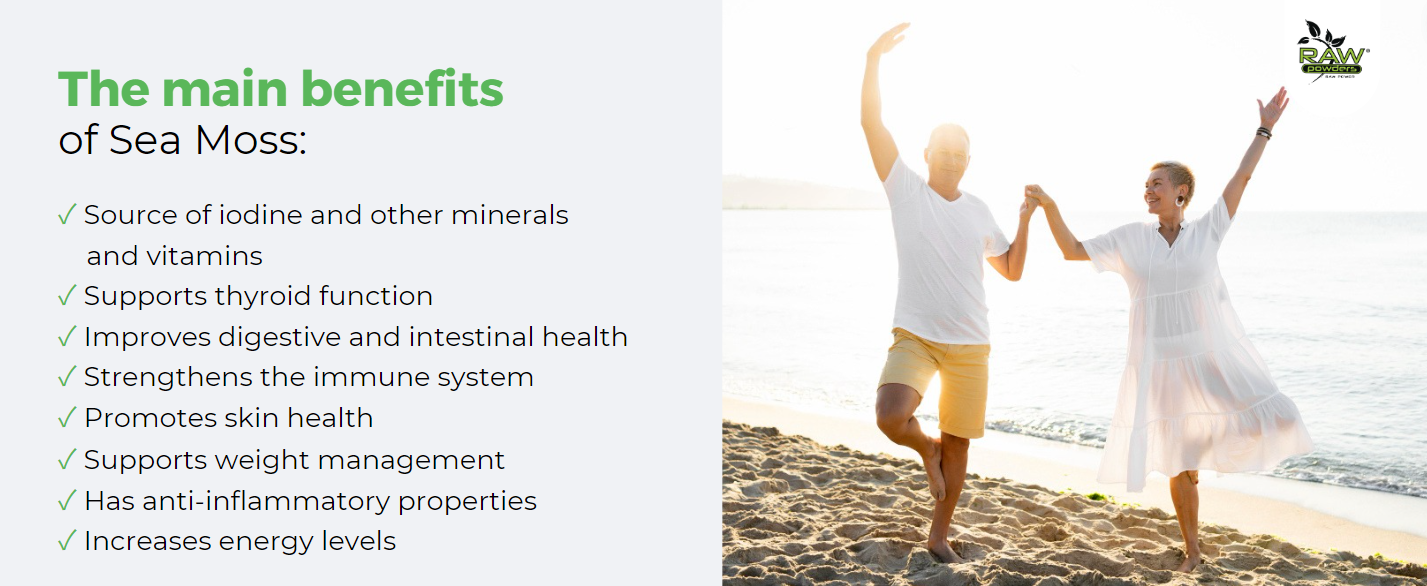
Here are some of the key benefits of sea moss that are supported by scientific research:
- Rich in Nutrients:
- Iodine: Sea moss, like other seaweeds, is a significant source of iodine, an essential element for thyroid hormone production [2].
- Other Minerals and Vitamins: Seaweeds, including sea moss, are known to be rich in various minerals and nutrients such as fiber, protein, vitamins (including vitamin C), and essential amino acids [3].
- Supports Thyroid Health: Sea moss's iodine content is crucial for thyroid function. However, excessive iodine intake from sea moss can lead to thyroid issues. For instance, a case study highlighted the development of Jod-Basedow phenomenon, a form of thyrotoxicosis due to excess iodine intake from herbal supplements containing sea moss [4].
- Improves Digestion and Gut Health: Sea moss has a mucilaginous texture, which can help soothe the mucous membranes in the digestive tract. This may aid in relieving digestive issues like gastritis, ulcers, and indigestion. Research on this specific claim about sea moss improving digestion and gut health was not directly found in the provided studies.
- Boosts Immune Function: Its nutrient content, particularly vitamin C and amino acids, may support the immune system and help the body fight off infections. Although specific studies on sea moss boosting immune function were not identified, its nutrient-rich composition, especially in vitamins like vitamin C, can contribute to overall immune health.
- Promotes Skin Health: Applied topically or ingested, sea moss can improve skin health due to its vitamin and mineral content. It may help with conditions like eczema, psoriasis, and acne.
- Sea moss contains various bioactive compounds like carotenoids, vitamin A, C, and E, polyphenols, minerals, and amino acids, which are beneficial for skin health. For example, the topical application of Caulerpa spp. (which includes seaweeds like sea moss) can suppress UV-B radiation-induced collagen damage and improve collagen expression, indicating its potential in skin care products [5].
- Another study on marine algae found that they contain high amounts of macrominerals and trace elements, more than land plants, which could be beneficial for skin health when used in cosmetic formulations [6].
- Supports Weight Loss: Being low in calories and high in nutrients, sea moss can be a valuable addition to a weight loss diet. Its fiber content also promotes a feeling of fullness, potentially reducing overall food intake. Research on sea moss specifically targeting weight loss was not found in the studies reviewed.
- Anti-inflammatory Properties: Sea moss possesses anti-inflammatory and antioxidant properties, which may help in reducing inflammation in the body and protecting cells from damage. While specific studies on sea moss's anti-inflammatory properties were not identified, its nutrient composition, including antioxidants, could contribute to anti-inflammatory effects.
- Improves Energy Levels: The iron content in sea moss helps in the formation of hemoglobin in red blood cells, which is essential for transporting oxygen throughout the body, thereby boosting energy and combating fatigue. The role of iron in sea moss in boosting energy levels and combating fatigue was not directly addressed in the studies. However, sea moss's rich mineral content, including iron, is likely to contribute to overall energy and health.
It's important to note that while sea moss has these potential benefits, it should be consumed in moderation. Over-consumption of sea moss, particularly due to its high iodine content, can lead to health problems. Read about Sea Moss use and dosage recommendations and possible side effects of Sea Moss on the blog.
As with any supplement, especially if you have a medical condition or are taking medication, it's best to consult a healthcare professional before adding sea moss supplements to your diet.
Nutritional Profile of Sea Moss
At the heart of Sea Moss's superfood status is its impressive array of nutrients. This marine plant is a treasure trove of essential vitamins and minerals. It contains significant amounts of vitamins A, B, C, and D, which are crucial for maintaining good health. However, what sets Sea Moss apart is its rich content of omega-3 fatty acids and iodine, two elements often scarce in plant-based diets. These nutrients are vital for brain health, thyroid function, and reducing inflammation. Along with these, Sea Moss is a good source of iron, calcium, magnesium, zinc, and potassium, making it an excellent supplement for those looking to bolster their daily nutrient intake [3, 2].
The approximate number of biochemicals in red species of seaweeds is more than 700. They include enzymes, phenolic compounds, flavonoids, essential amino acids and many others. The majority of these contents have shown promising biological efficiencies with potential health benefits.
Polysaccharides are the main components in the cell wall of red algae and represent about 40–50% of the dry weight [7]. And carrageenan is one among them, which fulfills the criteria of polysaccharide; it is a natural carbohydrate obtained from edible red seaweeds, and the name Carrageenan is derived from Sea Moss known also as Carrageen Moss, and Carraigin [8].
Carrageenan have been used for a long time as a medicinal remedy as a mucilage against diarrhea, dysentery, gastric ulcers and as a component of numerous health teas, for example, for colds [9].
And now Carrageenans, this major phycocolloid group of red algae, have been extensively investigated for their vast array of bioactivities such as anticoagulant, antiviral, cholesterol-lowering effects, immunomodulatory activity, and antioxidants. It possesses promising activity both in vitro and in vivo animal studies, showing promising potential to be developed as therapeutic agents [10].
Another advantage of red algae assumption is the uptake of calcium for our organisms. For example, it has been analyzed the presence of calcium in Chondrus crispus (Rhodophyta), commonly known as Irish moss, and compared it with the calcium concentration present in the milk, which was lower [11].
Health Benefits of Sea Moss
Sea Moss, with its rich nutritional profile, offers a myriad of health benefits. It enhances immune system support, thanks to its high vitamin and mineral content. For digestive health, its fibrous nature aids in soothing the gut lining and promoting healthy digestion. The results suggest multiple prebiotic effects, such as influencing the composition of gut microbial communities, improvement of gut health and immune modulation in rats supplemented with cultivated C. crispus [12].
Its nutrients are also beneficial for skin, hair, and nail health, providing essential vitamins and minerals for maintenance and repair.
Athletes may find Sea Moss particularly useful for joint and muscle strength, as it contains compounds that support joint health and muscle recovery. Additionally, it aids in cognitive and mental health, with its high content of omega-3 fatty acids and minerals supporting brain function. Lastly, Sea Moss contributes to heart health and cholesterol management through its ability to help regulate cholesterol levels and support cardiovascular health.
As it was shown in one new study the Red Seaweed has an enhanced effect in the testicular function of the animal which might increase their fertility and sexual activity [13].
The results from another study (worms) suggested that extract from the cultivated, red seaweed Chondrus crispus (CCME) possessed neuroprotective activity. The multiple compounds in the CCME extract may function synergistically towards the neuro-protection. Thus, apart from its application as a functional food, the tested red seaweed, C. Crispus, might find promising pharmaceutical applications for potential novel anti-neurodegenerative drugs for humans [14].
Sea Moss in Diet and Recipes
Incorporating Sea Moss into your diet can be both beneficial and delicious. It can be consumed in various forms – as a gel, in capsules, or as a powder. To make Sea Moss gel, simply soak the dried seaweed and blend it until smooth. This gel can be added to smoothies, teas, or as a thickener in soups and sauces.
For a quick and nutritious breakfast, blend Sea Moss gel into your morning smoothies. It pairs well with fruits like bananas and berries, offering a nutrient-packed start to your day. Sea Moss can also be used in vegan baking as a binding agent, adding a nutritional boost to your baked goods.
Experiment with Sea Moss in soups and stews for added thickness and nutrition. Its neutral taste makes it a versatile ingredient in a wide array of recipes, enhancing your meals with its health benefits without altering the flavor profile.
Is Sea Moss safe for everyone?
If you're taking anticoagulant medication such as warfarin, your GP or dietician may suggest that you monitor the vitamin K-rich foods in your diet, such as seaweed, to ensure you're eating similar amounts consistently. Another nutrient high in seaweed is potassium. Some medicines work by raising potassium levels in the blood, so if you are taking one of these, you should be careful about eating potassium-rich foods such as seaweed.
Seaweed can absorb and store large amounts of minerals and can accumulate toxic heavy metals such as cadmium, mercury, aluminum and lead. However, one study suggests that the risk of toxicity appears to be low, although it is best to consume sea moss, as with other sea vegetables, in moderation [15].
If you're taking prescription medication, have a medical condition or other concerns, speak to your doctor for further advice.
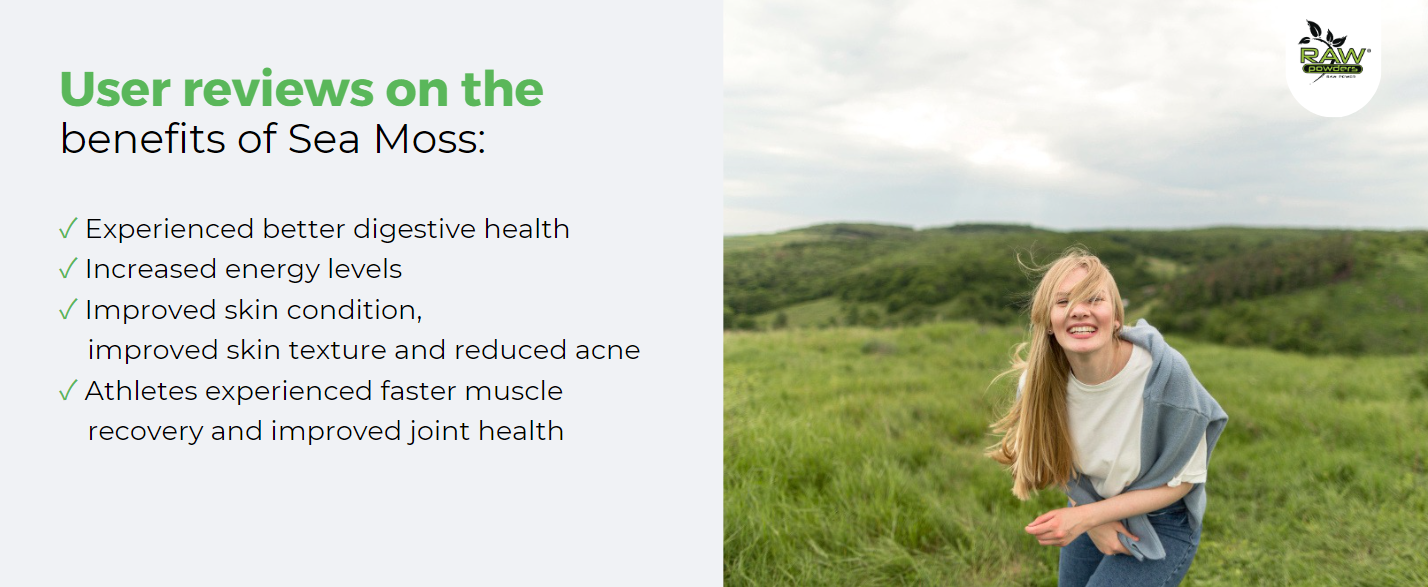
Personal testimonials and expert opinions about Sea Moss
Sea Moss has been widely acknowledged for its diverse health benefits. Many have experienced enhanced digestive health and increased energy levels, attributing these improvements to the regular inclusion of Sea Moss in their diet [16]. Additionally, its positive effects on skin health, such as improved texture and reduced acne, have been noted [17]. Notably, athletes have benefited from its consumption, reporting faster recovery times and improved joint health [18]. These collective experiences highlight the adaptability and effectiveness of Sea Moss in promoting various aspects of health and wellness.
Numerous studies and expert analyses have supported the health claims of Sea Moss. Research highlights its role in boosting immune function due to its high vitamin and mineral content [19]. Experts in nutrition also point to its benefits in supporting thyroid health, due to its iodine content, and its anti-inflammatory properties [16, 20]. These scientific insights lend credibility to the use of Sea Moss as a supplement for enhancing overall health and wellness.
These studies provide a scientific basis for the claims about Sea Moss's health benefits, supporting its use as a supplement for enhancing various aspects of health and wellness. However, it's important to consider the potential risks associated with excessive consumption, especially in terms of iodine intake.
Sustainability and Ethical Sourcing
Sustainability is key in the harvesting of Sea Moss. Responsible suppliers ensure that their harvesting methods do not damage the marine ecosystem. Ethical sourcing also involves fair trade practices, ensuring that local communities involved in harvesting are treated fairly and benefit economically. These practices not only protect the environment but also support the long-term availability of this valuable resource.
In conclusion, the rich nutritional profile and myriad health benefits of Sea Moss help to explain its growing popularity in the superfood arena. From supporting thyroid health and digestion to boosting immunity and improving skin health, Sea Moss serves as a versatile and powerful natural supplement. However, mindful consumption is key given its high iodine content and potential for heavy metal accumulation. Emphasizing sustainable and ethical sourcing practices ensures its continued availability and benefits to consumers. With supportive personal experience and scientific backing, sea moss stands out as a valuable component of a healthy lifestyle.
Medical Disclaimer
The information provided in our articles is solely for educational purposes and should not be considered medical advice or instruction. No action or inaction should be taken based solely on the contents of this information. Readers should consult their health care professional on any matter related to their health and well-being. The information and opinions provided here are believed to be accurate and sound, based on the best judgment available to the authors, but readers who fail to consult with appropriate health authorities assume the risk of any injuries. The publisher is not responsible for errors or omissions.
Please be aware that different countries may have specific regulations and that this disclaimer does not replace the need for consultation with a healthcare provider before beginning or changing a treatment or supplement regimen. The information contained in this article is not intended to diagnose, treat, cure, or prevent any disease. Individual results may vary.
References
- Senthil Arun Kumar, Lindsay Brown. Seaweeds as potential therapeutic interventions for the metabolic syndrome. Review: Rev Endocr Metab Disord. 2013 Sep;14(3):299-308. doi: 10.1007/s11154-013-9254-8. PMID: 23959342. https://pubmed.ncbi.nlm.nih.gov/23959342/
- Darias-Rosales, J., Rubio, C., Gutiérrez, Á., Paz, S., & Hardisson, A. (2020). Risk assessment of iodine intake from the consumption of red seaweeds (Palmaria palmata and Chondrus crispus). Environmental Science and Pollution Research, 27, 45737 - 45741. https://doi.org/10.1007/s11356-020-10478-9.
- Syad, A., Shunmugiah, K., & Kasi, P. (2013). Seaweeds as nutritional supplements: Analysis of nutritional profile, physicochemical properties and proximate composition of G. acerosa and S. wightii. Biomedicine & Preventive Nutrition, 3, 139-144. https://doi.org/10.1016/J.BIONUT.2012.12.002.
- Khalifa, M., Aftab, H., & Kantorovich, V. (2021). “Fueling the Fire” - Irish Sea-Moss Resulting in Jod-Basedow Phenomenon in a Patient With Grave’s Disease. Journal of the Endocrine Society, 5, A906 - A906. https://doi.org/10.1210/jendso/bvab048.1849.
- Wiraguna, A., Pangkahila, W., & Mantik-Astawa, a. (2013). PHOTOCHEMOPROTECTION OF CAULERA SPP ACTIVE COMPONENT ON RAT MODEL SKIN. Indonesia Journal of Biomedical Science. https://doi.org/10.15562/ijbs.v7i2.115.
- P. Rupérez. Mineral content of edible marine seaweeds. Food Chemistry, Volume 79, Issue 1, October 2002, Pages 23-26. https://doi.org/10.1016/S0308-8146(02)00171-1.
- Mona M. Ismail, Badriyah S. Alotaibi, Mostafa M. El-Sheekh. Therapeutic Uses of Red Macroalgae. Review: Molecules. 2020 Sep 25;25(19):4411. doi: 10.3390/molecules25194411. PMID: 32992919 PMCID: PMC7583832. https://pubmed.ncbi.nlm.nih.gov/32992919/
- Loic Hilliou. Hybrid carrageenans: isolation, chemical structure, and gel properties. Review: Adv Food Nutr Res. 2014:72:17-43. doi: 10.1016/B978-0-12-800269-8.00002-6. PMID: 25081075. https://pubmed.ncbi.nlm.nih.gov/25081075/
- Silvia Lomartire, João Carlos Marques, Ana M. M. Gonçalves. An Overview to the Health Benefits of Seaweeds Consumption. Review: Mar Drugs. 2021 Jun 15;19(6):341. doi: 10.3390/md19060341. PMID: 34203804 PMCID: PMC8232781. https://pubmed.ncbi.nlm.nih.gov/34203804/
- Ratih Pangestuti, Se-Kwon Kim. Biological activities of carrageenan. Review: Adv Food Nutr Res. 2014:72:113-124. doi: 10.1016/B978-0-12-800269-8.00007-5. PMID: 25081080. https://pubmed.ncbi.nlm.nih.gov/25081080/
- Silvia Lomartire, João Carlos Marques, Ana M. M. Gonçalves. An Overview to the Health Benefits of Seaweeds Consumption. Review: Mar Drugs. 2021 Jun 15;19(6):341. doi: 10.3390/md19060341. PMID: 34203804 PMCID: PMC8232781. https://pubmed.ncbi.nlm.nih.gov/34203804/
- Jinghua Liu, Saveetha Kandasamy, Junzeng Zhang, Christopher W. Kirby, Tobias Karakach, Jeff Hafting, Alan T. Critchley, Franklin Evans, Balakrishnan Prithiviraj. Prebiotic effects of diet supplemented with the cultivated red seaweed Chondrus crispus or with fructo-oligo-saccharide on host immunity, colonic microbiota and gut microbial metabolites. BMC Complement Altern Med. 2015 Aug 14:15:279. doi: 10.1186/s12906-015-0802-5. PMID: 26271359 PMCID: PMC4535385. https://pubmed.ncbi.nlm.nih.gov/26271359/
- Nehad M. Ibrahim a, Shimaa R. Ibrahim c, Osama H. Ashour d, Tharwat G. Abdel-Kader b, Monaser M. Hassan b, Rania S. Ali. The effect of Red Seaweed (Chondrus crispus) on the fertility of male albino rats. Saudi Journal of Biological Sciences. Volume 28, Issue 7, July 2021, Pages 3864-3869. https://doi.org/10.1016/j.sjbs.2021.03.059.
- Jinghua Liu, Arjun H. Banskota, Alan T. Critchley, Jeff Hafting, Balakrishnan Prithiviraj. Neuroprotective effects of the cultivated Chondrus crispus in a C. elegans model of Parkinson's disease. Comparative Study Mar Drugs. 2015 Apr 14;13(4):2250-66. doi: 10.3390/md13042250. PMID: 25874922 PMCID: PMC4413210. https://pubmed.ncbi.nlm.nih.gov/25874922/
- C. Rubio, G. Napoleone, G. Luis-González, A. J. Gutiérrez, D. González-Weller, A. Hardisson, C. Revert. Metals in edible seaweed. Chemosphere. 2017 Apr:173:572-579. doi: 10.1016/j.chemosphere.2017.01.064. Epub 2017 Jan 12. PMID: 28152409. https://pubmed.ncbi.nlm.nih.gov/28152409/
- Mohamed, S., Hashim, S., & Rahman, H. (2012). Seaweeds: A sustainable functional food for complementary and alternative therapy. Trends in Food Science and Technology, 23, 83-96. https://doi.org/10.1016/J.TIFS.2011.09.001.
- Kim, J., Lee, J., Kim, K., & Kang, N. (2018). Beneficial Effects of Marine Algae-Derived Carbohydrates for Skin Health. Marine Drugs, 16. https://doi.org/10.3390/md16110459.
- Kim, J., Lee, J., Kim, K., & Kang, N. (2018). Beneficial Effects of Marine Algae-Derived Carbohydrates for Skin Health. Marine Drugs, 16. https://doi.org/10.3390/md16110459.
- Corino, C., Modina, S., Giancamillo, A., Chiapparini, S., & Rossi, R. (2019). Seaweeds in Pig Nutrition. Animals : an Open Access Journal from MDPI, 9. https://doi.org/10.3390/ani9121126.
- Khalifa, M., Aftab, H., & Kantorovich, V. (2021). “Fueling the Fire” - Irish Sea-Moss Resulting in Jod-Basedow Phenomenon in a Patient With Grave’s Disease. Journal of the Endocrine Society, 5, A906 - A906. https://doi.org/10.1210/jendso/bvab048.1849.




_front%20(1)-250x250.png)


_front%20(1)-250x250.png)

-(NN)_front%20(1)-min-250x250.png)

_front%20(1)-250x250.png)


_front%20(1)-min-250x250.png)
_front%20(1)%20(1)-250x250.png)




_front%20(1)-min-250x250.png)


